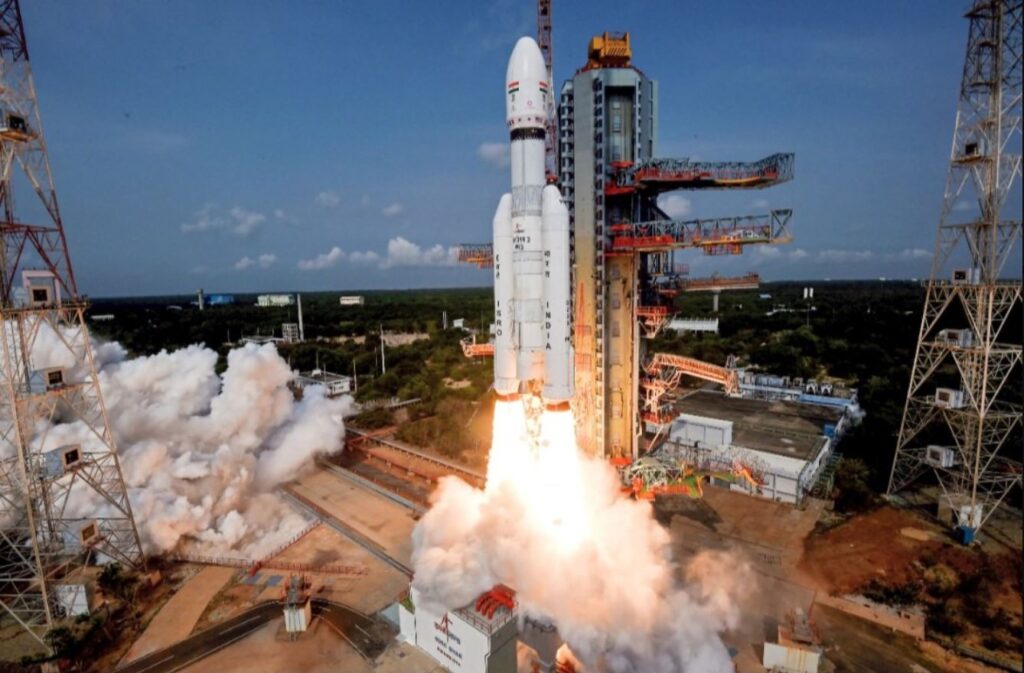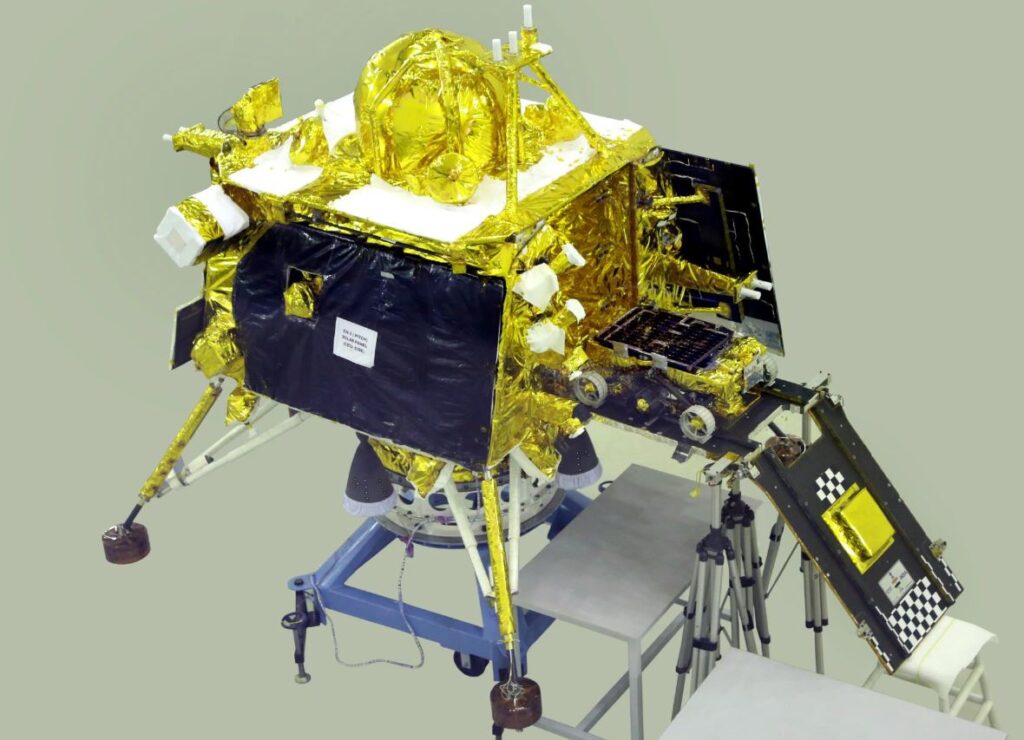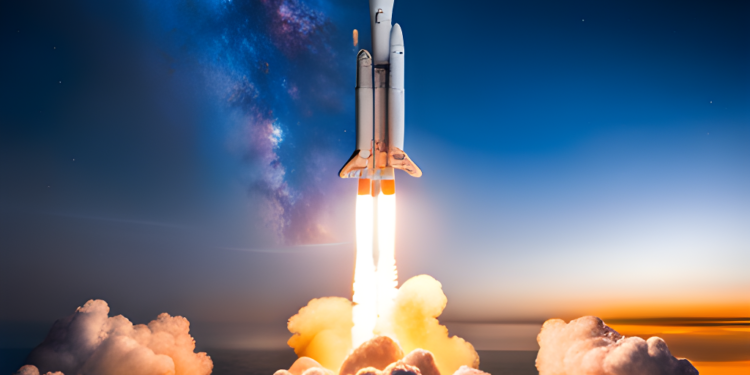Over the past decade, India has witnessed a remarkable transformation in space sector, propelled by visionary leadership and strategic investments. Under the guidance of PM Narendra Modi, the nation has made substantial progress in the domains of space exploration, technology advancement, and nurturing private sector involvement
With a focus on international collaborations, innovation, and cost-effectiveness, India has emerged as a formidable player in the global space market. This article explores the factors driving India’s space sector growth and provides an overview of its achievements in the last decade.
India’s Evolving Space Missions
Prior to 2014, India’s space missions were characterized by a modest average of 2.15 launches per year. Following 2014, the course of India’s space sector took a momentous turn, experiencing a remarkable surge in the frequency of missions.
The nation experienced a remarkable surge, with an impressive average of 5.9 spacecraft missions per year, showcasing a significant advancement in its pursuit of space exploration. This surge reflects India’s growing capabilities and commitment to advancing its presence in the global space arena.
One of the pivotal milestones that garnered global attention was achieved by the Indian Space Research Organization (ISRO) when it was successful in launching a staggering 104 satellites in a single PSLV (Polar Satellite Launch Vehicle) flight. This extraordinary accomplishment showcased India’s efficiency, expertise, and technical prowess in the field of space exploration.

The historic feat of launching 104 satellites in a single space mission has not only demonstrated India’s ability to efficiently manage complex operations but also emphasized its commitment to providing cost-effective access to space.
This landmark achievement placed India in the global spotlight, solidifying its reputation as a significant player in the space industry. Through these space missions, India has firmly cemented its position as a nation with the capability to undertake and successfully accomplish ambitious space projects.
The heightened frequency of launches and the successful deployment of multiple satellites in a single mission have demonstrated India’s exceptional ability to effectively coordinate complex space operations with efficiency and precision. These accomplishments have propelled India into the league of nations with advanced space programs, alongside established space powers.
India’s space program is one of the most ambitious in the world. The Indian Space Research Organisation (ISRO) has developed a wide range of launch vehicles, satellites, and spacecraft. ISRO has also made significant contributions to the fields of space exploration, remote sensing, and satellite communications. In just nine years, India has launched 389 foreign satellites, earning a staggering ₹3,300+ crore in the process. This is a testament to India’s growing space prowess and its expanding global partnerships.
Policy Reforms and Private Sector Participation
Prime Minister Narendra Modi has emerged as a fervent advocate for unleashing India’s untapped potential in the space sector. With a visionary outlook, PM Modi recognizes the transformative impact that space programs can have on the lives of Indian citizens, particularly those belonging to economically weaker sections of society.
India’s space sector budget has increased by a whopping 123% in the last 10 years, from ₹5615 crore to ₹12543 crore. This significant increase in budget is a testament to the Indian government’s commitment to space exploration and its ambition to become a leading space power. With this increased funding, India will be able to undertake even more ambitious space missions and make significant contributions to the global space community.
Understanding the vast possibilities that lie within the realm of space technology, he has been a driving force behind the push to actively invest in cutting-edge advancements.Under his leadership, the Indian government has implemented significant policy reforms aimed at providing a level playing field and a favorable regulatory environment for private players in the space sector.
This move has opened up new avenues for innovation and growth, encouraging the involvement of private companies in the manufacturing and launch of space vehicles. By facilitating collaboration between the public and private sectors, PM Modi has set a strong foundation for India’s space industry to thrive.
To ensure effective governance and supervision of non-governmental entities in the space sector, PM Modi’s government established the Indian National Space Promotion and Authorisation Centre (IN-SPACe) as an autonomous agency under the Department of Space (DOS). This step has streamlined the approval process, aligned stakeholders, and fostered a conducive environment for private industry veterans to contribute their expertise.
The prime minister’s unwavering support and facilitation have empowered private players to think big and seize the global opportunities in the space sector. A new testament to this encouragement is the establishment of a private launchpad and mission control center at the Satish Dhawan Space Center (SDSC) in Sriharikota. Operated by the Indian space-tech startup Agnikul, this facility serves as a testament to the collaborative efforts between the government and the private sector.
Since its inception, IN-SPACe has received around 135 applications from various non-government entities in the space sector, and over 140 space startups have been registered, bringing forth new innovations and technologies. The active involvement of private players, coupled with the government’s support, has made the space industry more democratic, inclusive, and dynamic.
As a result of PM Modi’s visionary approach and vision, India’s space sector is on the cusp of remarkable growth in the forthcoming years. With the growing participation of private entities, favorable policies, and a steadfast emphasis on technological advancements, India is strategically positioned to attain its goal of capturing a significant 10% share of the global space sector market by 2030.
The prime minister’s relentless efforts to encourage young minds and promote entrepreneurship in the space sector are paving the way for a prosperous future, where space technology plays a pivotal role in India’s economic growth story.
Encouraging Innovation and Startups
The government’s facilitation and support have been instrumental in nurturing the growth of numerous space startups in India. These startups have brought in a wave of new innovations and technologies, driving the evolution of the country’s space sector.
One key factor that has contributed to their success is the presence of private industry veterans within the government. Drawing upon their expertise and wealth of experience, these professionals have effectively streamlined approval processes and fostered alignment among stakeholders, resulting in streamlined decision-making within significantly shorter timeframes.
The contributions of startups extend beyond their innovative solutions. They play a pivotal role in the broader space ecosystem by collaborating with the Indian Space Research Organization (ISRO) on various projects.
The synergy generated through this collaboration not only expedites the growth of startups but also nurtures a dynamic culture of innovation and collaboration within the ecosystem.The result is a powerful combination that drives the growth and advancement of the space sector in India.
ISRO has taken proactive measures to support startups in their journey. Initiatives such as technology transfers, where ISRO shares its knowledge and expertise with startups, have facilitated the development of cutting-edge solutions. This collaboration not only accelerates the growth of startups but also fosters a culture of innovation and collaboration within the ecosystem.
Furthermore, ISRO has also opened its launch sites to startups, providing them with access to world-class infrastructure for conducting trials and tests. This gesture not only reduces the barriers to entry but also promotes a collaborative environment where startups can flourish. By lending their launch sites, ISRO has empowered startups to realize their ambitious goals and contribute to the advancement of the Indian space sector.
International Collaborations and Milestones
India’s commitment to space exploration extends beyond its borders, as the country actively pursues international collaborations in the field. Recognizing the value of cooperation and shared knowledge, India has joined the prestigious Artemis Accords. This collective effort brings together like-minded nations with a common goal of advancing civil space exploration. By participating in the Artemis Accords, India not only strengthens its international partnerships but also gains access to valuable expertise and resources.
In a landmark development, India has also forged a significant collaboration with NASA, the renowned U.S. space agency. This collaboration entails a joint mission to the International Space Station (ISS) in 2024. This ambitious endeavor marks a significant milestone in India’s space journey, as it aligns with its objective of expanding its presence and capabilities in the realm of human spaceflight.
Collaborating with NASA allows India to leverage the expertise and infrastructure of one of the world’s leading space agencies, fostering a mutual exchange of knowledge and technological advancements.
In addition to the international collaborations, India is set to embark on a highly anticipated mission of its own—Chandrayaan-3. Scheduled for launch in the first quarter of 2023, Chandrayaan-3 represents India’s continued commitment to lunar exploration. This mission has three primary objectives: to demonstrate a safe and soft landing on the lunar surface, to showcase rover roving capabilities, and to conduct in-situ scientific experiments.

By achieving these objectives, India aims to further expand its understanding of the moon’s geology, surface composition, and potential resources. Chandrayaan-3 will build upon the successes and knowledge gained from its predecessor missions, bolstering India’s reputation as a capable and forward-thinking space-faring nation.
These international collaborations and ambitious missions not only elevate India’s standing in the global space community but also foster a spirit of cooperation and knowledge exchange. Through strategic partnerships with likeminded nations and organizations, India gains valuable access to advanced technologies, best practices, and invaluable expertise, propelling its space program to unprecedented levels of achievement.
Opportunities and Future Growth
The Indian space sector is not only a domain of technological advancements and scientific achievements but also a promising landscape for investments and business opportunities. With a strategic focus on cost-effectiveness, self-reliance, and international collaborations, the sector is poised for substantial growth, making it an attractive prospect for entrepreneurs, investors, and businesses.
One of the key areas that presents significant opportunities in the Indian space sector is the expansion of satellite-based services. India’s space agency, ISRO, has developed expertise in remote sensing, satellite-based navigation, and meteorology, among other domains. These specialized services have wide-ranging applications, including environmental monitoring, disaster management, agriculture, urban planning, and communication.
As the demand for accurate and real-time data continues to grow, there is a burgeoning need for satellites to support these applications. This creates ample opportunities for companies to develop and launch satellites tailored to meet specific requirements, thereby fostering innovation and driving the growth of the sector.
India’s launch capabilities further enhance its attractiveness as a destination for space-related investments and businesses. ISRO’s Polar Satellite Launch Vehicle (PSLV) has a proven track record of successful launches, gaining international recognition for its reliability and cost-effectiveness.
Additionally, the upcoming Small Satellite Launch Vehicle (SSLV) promises to provide even more competitive launch services. These launch vehicles offer a range of payload capacities, making them suitable for various satellite sizes and missions. By leveraging India’s launch capabilities, companies can efficiently and affordably deploy their satellites into orbit, reducing operational costs and maximizing returns on investment.
Moreover, India’s emphasis on self-reliance and indigenization in the space sector opens up opportunities for businesses to collaborate with Indian entities, including ISRO, in developing cutting-edge technologies and manufacturing space-related components and systems.
The country’s push for self-sufficiency aligns with the government’s “Make in India” initiative, which aims to foster domestic manufacturing and attract foreign investment. This creates a favorable environment for businesses to establish partnerships, contribute to the local ecosystem, and capitalize on the growing demand for space-related products and services.
India’s space sector has witnessed a remarkable transformation in the last decade, positioning the country as a significant player in the global space technology market. With visionary leadership, policy reforms, private sector participation, and international collaborations, India has achieved record-breaking missions and expanded its capabilities in space exploration and technology development.
The future of India’s space sector holds tremendous promise, as the nation continues to push the boundaries of space exploration and technology.








